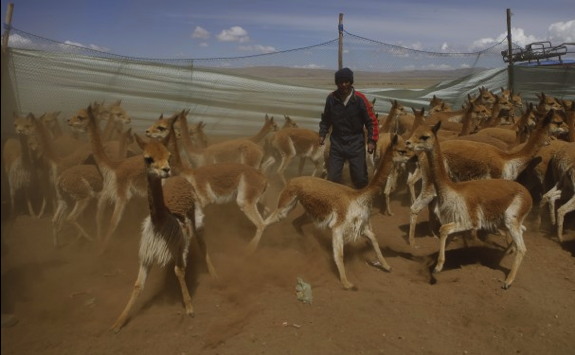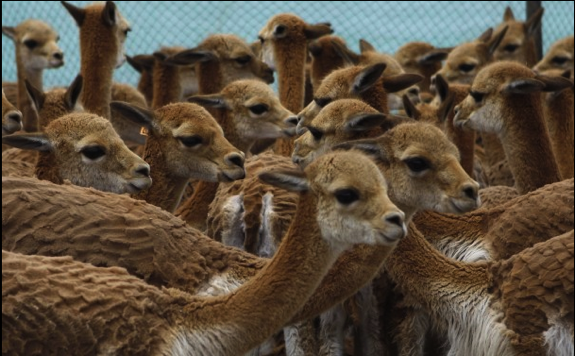
(above) (Juan Karita/ Associated Press ) - In this Oct. 7 2013 photo, wild vicunas stand grouped in a temporary corral before being released inside the Apolobamba protected nature reserve, the animal's natural habitat near the Andean village of Ucha Ucha, Bolivia. Every two years, Aymara Indian families near Ucha Ucha organize to shear the wool of these wild vicuna, a camelid that lives in the Andes' highland areas. Unprocessed wool from the vicuna, the smallest of the South American camelids, fetches between $300 and $500 a kilogram (about $140-$230 a pound).
MORE PHOTOS AT END OF STORY.
AP PHOTOS: Bolivian villagers team together to round up, shear wild vicunas for fine wool
October 14, 2013 - Washington Post (AP)
By Associated Press
UCHA UCHA, Bolivia — The roar of about 70 motorcycles shatters the quiet of the wind-swept Andean plain as Aymara villagers conduct a frenetic chase to round up wild vicunas for shearing.
The residents of Ucha Ucha used to form giant human cordons to corner the animals and harvest their fine fur, which produces one of the world's most expensive wools. But motorcycles are ideal on the flat, treeless landscape of Bolivia's altiplano.
Unprocessed wool from the vicuna, the smallest of the South American camelids, fetches between $300 and $500 a kilogram (about $140-$230 a pound). The fiber is highly prized by the world of fashion, and has been used to make suits for movie stars like Daniel Craig and tycoons like Donald Trump.
Ucha Ucha is 14,800 feet (4,500 meters) above sea level in the Apolobamba nature reserve, 167 miles (269 kilometers) northwest of the Bolivian capital of La Paz. The icy wind and burning sun at this altitude slice and bake the skin of the area's indigenous residents.
Every two years, about a hundred men and women from Ucha Ucha come together for the biennial vicuna shearing, which lasts four days.
First, they make an offering to the Pachamama (Mother Earth), then the motorcycles herd the animals into a corral made with sticks and netting, where the vicunas are held for about five hours before they are released.
Two men hold each vicuna down while another shears its fur. With luck they can gather 40 kilograms (nearly 90 pounds) of wool in a day.
"Before we sheared them every year, but now we do it every two years because the hairs are so small. The profits are divided among the community's members and it is a great help because at this altitude nothing grows," said Gregorio Blanco, head of the shearers.
Ucha Ucha residents say they made about $300 per family in the last shearing in 2011 and expect to make about the same this year.
Vicunas were once hunted to near extinction but now hunting them is forbidden and the Aymara shear and release the animals. The vicuna population has rebounded.
While llamas and alpacas have been domesticated, the vicuna still lives in the wild.
Copyright 2013 The Associated Press. All rights reserved. This material may not be published, broadcast, rewritten or redistributed.
More Photos below:
below: (Juan Karita/ Associated Press ) - In this Oct. 7, 2013 photo, Aymara Indian women set up a net to temporarily coral wild vicuna inside the Apolobamba protected nature reserve, the animal's natural habitat near the village of Ucha Ucha, Bolivia. Unprocessed wool from the vicuna, the smallest of the South American camelids, fetches between $300 and $500 a kilogram (about $140-$230 a pound). The fiber is highly prized by the world of fashion, and has been used to make suits for movie stars like Daniel Craig and tycoons like Donald Trump.
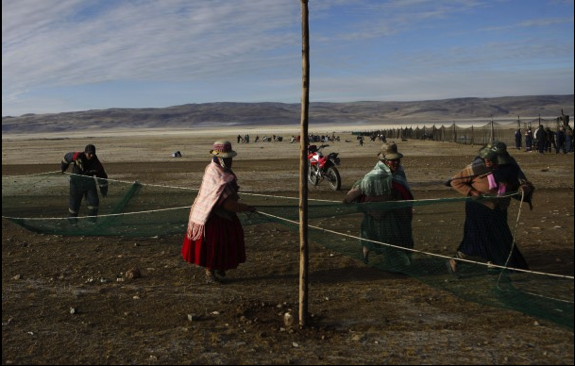
below: (Juan Karita/ Associated Press ) - In this Oct. 8, 2013 photo, Aymara Indians on motorbikes herd wild vicuna into a temporary corral inside the Apolobamba protected nature reserve, their natural habitat near the Andean village of Ucha Ucha, Bolivia. The residents of Ucha Ucha used to form giant human cordons to corner the animals and harvest their fine fur, which produces one of the world's most expensive wools. But motorcycles are ideal on the flat, treeless landscape of Bolivia's altiplano.
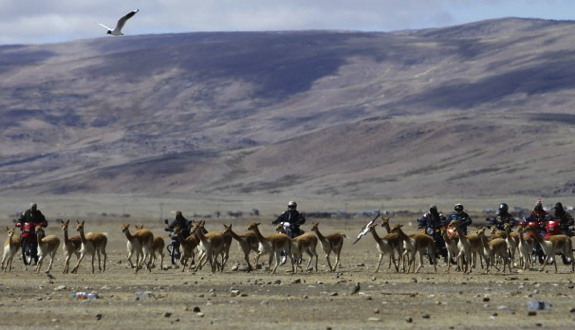
below: (Juan Karita/ Associated Press ) - In this Oct. 8, 2013 photo, wild vicuna run inside a temporary corral inside the Apolobamba protected nature reserve, their natural habitat near the Andean village of Ucha Ucha, Bolivia. The vicuna are an endangered species previously hunted by poachers for their fine wool. Today Bolivia protects them in this reserve, sheering and selling the wool worldwide without killing the animal.
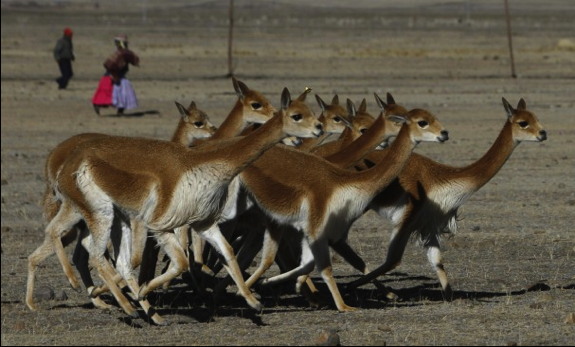
below: (Juan Karita/ Associated Press ) - In this Oct. 8, 2013 photo, Aymara Indian women try to grab wild vicuna for shearing inside a temporary corral inside the Apolobamba protected nature reserve, the animal's natural habitat near the village of Ucha Ucha, Bolivia. Ucha Ucha residents say they made about $300 per family in the last shearing in 2011 and expect to make about the same this year.
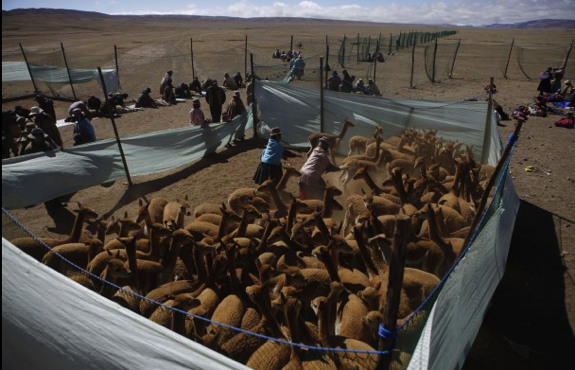
below: (Juan Karita/ Associated Press ) - In this Oct. 8, 2013 photo, wild vicuna move around inside a temporary corral inside the Apolobamba protected nature reserve, the animal's natural habitat near the village of Ucha Ucha, Bolivia. Every two years, about a hundred men and women from Ucha Ucha come together for the biennial vicuna shearing, which lasts four days. Vicunas were once hunted to near extinction but now hunting them is forbidden and the Aymara shear and release the animals. The vicuna population has rebounded.
